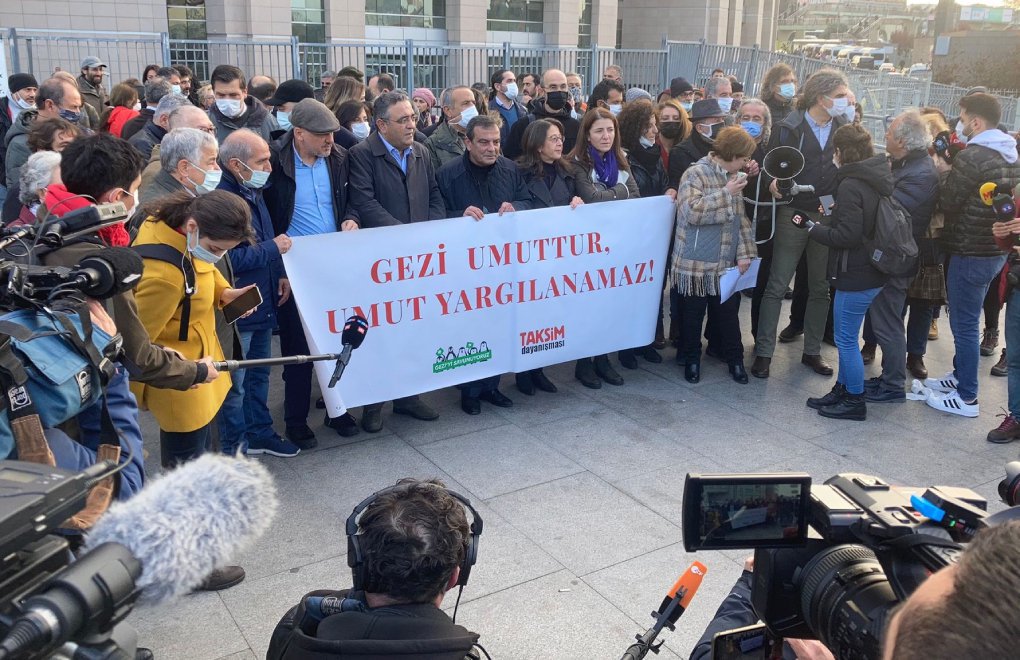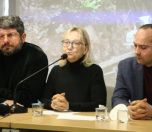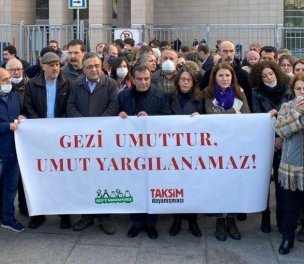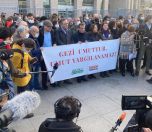Click to read the article in Turkish
Amnesty International has released a statement ahead of the fifth and probably final hearing of the Gezi trial to be held on Monday (March 21).
Announcing the final opinion as to the accusations between the hearings on March 4, 2022, the prosecutor's office requested an aggravated life sentence for arrested businessperson Osman Kavala and Mücella Yapıcı and up to 20 years in prison for six other defendants.
Speaking about the trial against this background, Nils Muižnieks, Amnesty International's Europe Director, has recalled that "this weekend, Osman Kavala marked his 1,600th day in jail" and raised concerns that "despite committing no internationally recognized crime, he remains arbitrarily detained on baseless charges in a facility far away from his family".
He has said, "Since 2017, the prosecuting authorities have tried to conjure a crime out of thin air, but have repeatedly failed. On the contrary, each tortuous twist in this politically motivated prosecution has further exposed the hollowness of the Turkish justice system".
Referring to his imprisonment, Muižnieks has said that "Osman Kavala will never get back the four-and-a-half years he has already spent behind bars for no other reason than his civil society activism" and added:
"But this shameful farce can only have one just outcome: the acquittal of Osman Kavala and all of his co-defendants. Crucially, Kavala himself must also be immediately and unconditionally released from prison."
Prosecutor's final opinion
The prosecutor has demanded that defendants Osman Kavala, who has been arrested for over 1,600 days, and Mücella Yapıcı be sentenced to aggravated life imprisonment on charge of "attempting to abolish the government of the Republic of Turkey by using force and violence".
Referring to Osman Kavala, the prosecutor has also requested that "his imprisonment over the crime that he committed as per the Article 312 of the Turkish Penal Code (TCK) continue, considering the current stage of the trial, the current state of evidence and the existence of a flight risk in the face of the sentence likely to be handed down if found guilty."
In the opinion as to the accusations, the prosecutor has demanded that other defendants Çiğdem Mater, Ali Hakan Altınay, Mine Özerden, Şerafettin Can Atalay, Tayfun Kahraman and Yiğit Ali Ekmekçi be sentenced to 15 to 20 years in prison each for "assistance to the attempted abolishment of the government of the Republic of Turkey by using force and violence".
Referring to the fugitive defendants Ayşe Pınar Alabora, Henry Jack Barkey, Can Dündar, Gökçe Yılmaz, Handan Meltem Arıkan, Hanzade Hikmet Germiyanoğlu, Mehmet Ali Alabora, Yiğit Aksakoğlu and İnanç Ekmekçi, the prosecutor has requested that their file be separated from this file and the execution of the warrants issued against them be awaited.
About Gezi trialThe Gezi trial began again on May 21, 2021 as the court of appeals overturned the verdicts of acquittal given by the local court. Arrested for over 1,200 days, businessperson and rights defender Osman Kavala and 15 other defendants appeared before the judge at the İstanbul 30th Heavy Penal Court in Çağlayan on charge of "attempting to overthrow the government." Here is a brief overview of the judicial process: Who is on trial?Osman Kavala, Mücella Yapıcı, Can Atalay, Tayfun Kahraman, Ali Hakan Altınay, Yiğit Aksakoğlu, Yiğit Ali Ekmekçi, Çiğdem Mater Utku and Mine Özerden, who were acquitted in the first trial; and Can Dündar, Mehmet Ali Alabora, Ayşe Pınar Alabora, Gökçe Tüylüoğlu, Handan Meltem Arıkan, Hanzade Hikmet Germiyanoğlu and İnanç Ekmekçi, whose files were separated, but have been merged again afterwards. Even though he was acquitted in the Gezi trial, Osman Kavala has been behind bars in Silivri Prison at the outskirts of İstanbul for over 1,200 days. Yiğit Aksakoğlu also served 220 days behind bars ias part of the Gezi trial. Who are the aggrieved parties?In the Gezi trial, where rights defenders were acquitted, the members of the 61st term cabinet, which was established in 2011, were referred to as the complainant aggrieved parties in the indictment. On the list of the aggrieved parties were the then PM Recep Tayyip Erdoğan, the then Deputy Prime Ministers Bülent Arınç, Ali Babacan, Beşir Atalay, Bekir Bozdağ, Emrullah İşler and the then Ministers Binali Yıldırım, Fatma Şahin, Egemen Bağış, Nihat Ergün, Faruk Çelik, Erdoğan Bayraktar, Ahmet Davutoğlu, Taner Yıldız, Suat Kılıç, Mehdi Eker, Hayati Yazıcı, Muammer Güler, Cevdet Yılmaz, Ömer Çelik, Mehmet Şimşek, Nabi Avcı, İsmet Yılmaz, Veysel Eroğlu, Mehmet Müezzinoğlu, Zafer Çağlayan and Sadullah Ergin. After founding the Future Party, Ahmet Davutoğlu announced that he withdrew from the files of criminal cases related to the crimes committed against him personally and were not of public nature, especially from the trials for insult, as an aggrieved party. DEVA Party Chair Ali Babacan also said, "I am not a complainant in the Gezi trial, nor am I an intervening party. Thinking that they were aggrieved, the prosecutor wrote the names of all members of the then government one by one. In our judicial system, there is no such thing as withdrawing from the position of an aggrieved party." What are the defendants charged with?In the first 657-page indictment, Gezi was defined as "a resurrection for coup". The defendants were accused of "organizing and funding the protests." They were charged with "attempting to overthrow the government", "damaging property", "damaging places of worship and cemeteries", "violating the Law on Firearms, Knives and Other Tools", "aggravated plunder" and "violating the Law on Protecting Cultural and Natural Assets." In reversing the acquittals, the court of appeals has also demanded that a criminal complaint be filed against the defendants on the grounds that they violated the Law no. 2911 on the Meetings and Demonstrations. According to the indictment, 16 defendants separately face 606 years to 2,970 years in prison on the offenses charges. What has happened till today?In July 2013, 26 people, including Mücella Yapıcı from the Chamber of Architects and Ali Çerkezoğlu from the İstanbul Medical Chamber, were detained. While they were released following their statements, the rights defenders faced a lawsuit for "founding and leading an organization" in March 2014. All defendants were acquitted in the ensuing trial heard by the İstanbul 33th Penal Court of First Instance on April 29, 2015. Afterwards, it was understood that prosecutor Muammer Akkaş was carrying out an investigation against the people who are currently on trial. Akkaş was also the person who gave the instruction to wiretap the rights defenders' phones. However, he was dismissed as part of an investigation into the December 17-25, 2014 operations and fled Turkey. İstanbul Public Prosecutor Yakup Ali Kahveci took over the file after Akkaş. The investigation, which also consisted of the evidence collected by Akkaş, was completed in 2019; the first hearing was held on June 24. Arrested pending trial, Yiğit Aksakoğlu was released at this hearing. A fews days after the second hearing, the Board of Judges and Prosecutors (HSK) changed the court board hearing the case. Accordingly, Galip Mert Perk was assigned as the Presiding Judge and Talip Ergen as a member of the court board. While the HSK did not change the place of duty of senior member Ahmet Tarık Çiftçioğlu, who had ruled in favor of the "continued arrest" of both Osman Kavala and Yiğit Aksakoğlu, the member of the court board who had expressed a dissenting opinion to the related ruling was assigned to another court. Examining the individual application of Osman Kavala, the European Court of Human Rights (ECtHR) pronounced its ruling of right violation on December 10, 2019 and ruled that Osman Kavala should be released immediately. At the final hearing on February 18, 2020, all defendants, except for the ones who were abroad, were acquitted of the offenses charged. Despite this acquittal and the ECtHR judgement, Osman Kavala was arrested again on another charge. Why are they on trial again?Following the acquittals in the Gezi trial, President and Justice and Development Party (AKP) Chair Recep Tayyip Erdoğan spoke at the group meeting of his party. Targeting Kavala, he said, "The person who stirred up Gezi was behind bars. They tried to acquit him with a maneuver." Shortly after this statement was made, the Board of Judges and Prosecutors (HSK) launched an inquiry against the three judges who were the members of the board of the İstanbul 30th Heavy Penal Court. The prosecutor's office also appealed against the verdicts of acquittal. Public Prosecutor Edip Şahiner demanded that the acquittals be reversed. The 3rd Penal Chamber of the İstanbul Regional Court of Justice, the court of appeals, reversed the rulings of acquittal handed down by the local court, the İstanbul 30th Heavy Penal Court, on January 22, 2021. Referring to the charges brought against the defendants in the indictment, the court justified its reversal by indicating that the pieces of evidence such as the defendants' social media posts, press statements and slogans chanted were not considered in handing down the ruling. |
A brief summary of Osman Kavala's arrest17 October 2017: Osman Kavala was detained. 1 November 2017: Kavala was ordered arrest on the charges of 'attempting to overthrow the government or to prevent it from exercising its functions' (Article 312 of the TCC) and 'attempting to overthrow the constitutional order through force and violence' (Article 309 of the TCC). 24 December 2018: The investigation files under Article 309 and 312 of the TCC were separated. 19 February 2019: The first indictment against Kavala was issued under Article 312 of the TCC 16 months after he was arrested. 11 October 2019: A release order was issued in favor of Kavala on the charge under Article 309 of the TCC. 10 December 2019: The ECtHR ruled that Kavala's detention constituted a violation of human rights and that he should be released immediately. 18 February 2020: A decision of acquittal was issued in the trial heard under Article 312 of the TCC. 19 February 2020: After the decision of acquittal, Kavala was not released but was arrested again on the charge under Article 309 of the TCC. 9 March 2020: Kavala was ordered arrest under Article 328 of the TCC. 20 March 2020: The second release order was issued in favor of Kavala under Article 309 of the TCC. However, his detention on the charge of espionage under Article 328 of the TCC continued. 3 September 2020: The Committee of Ministers of the Council of Europe, which oversees the execution of the judgments of the ECtHR, ruled that the judgment of the ECtHR should be executed and that Kavala should be released immediately. 29 September 2020: The Constitutional Court of the Republic of Turkey decided to examine the application of Kavala regarding his unlawful detention. However, it postponed the examination as the second indictment including the charges under Articles 309 and 328 (espionage) of the TCC was submitted to the court on the same day. 29 September 2020: In the second meeting in which this matter was discussed, the Committee of Ministers of the Council of Europe ruled that an interim decision should be drafted to be issued in the event that the judgment of the ECtHR is not executed. 3 December 2020: The Committee of Ministers of the Council of Europe issued an interim decision that Kavala should be released immediately and that the Constitutional Court should examine the file in accordance with the judgment of the ECtHR without further delay. 15 December 2020: The Constitutional Court decided to examine the application regarding the unlawful detention and ruled that the file should be referred to the General Assembly of the Constitutional Court. 18 December 2020: The 36th Assize Court ruled that the detention shall continue. The second hearing was scheduled on 5 February. 29 December 2020: The Constitutional Court ruled with 8 to 7 votes that the decision of Kavala did not constitute any violation of right. The reasoned judgment included the strongly dissenting opinions of the judges who voted that the detention constituted a violation of rights. 22 January 2021: The Appellate Court overturned the decision of acquittal in the Gezi trial. It ruled that the file concerning this trial shall be examined together with the files under Articles 309 and 328 of the TCC. 28 January 2021: After the decision of acquittal was overturned, the 30th Assize Court issued a preliminary proceedings report and scheduled the trial concerning the consolidated files on 21 May 2021. 5 February 2021: In the trial heard in the 36th Assize Court, the Court ruled that Kavala's trial shall be consolidated with the Gezi Trial, which will be heard again in the 30th Assize Court under Article 312 of the TCC, and that the detention of Kavala on the charges of espionage under Article 328 of the TCC shall continue. 30 April 2021: As a result of its examination of the detention, the 30th Assize Court ruled that the detention of Kavala shall continue. 12 May 2021: In its weekly meeting of 12 May 2021, the Committee of Ministers of the Council of Europe reviewed Kavala's file and expressed their great concern that Turkish authorities and courts did not take the necessary steps to end Kavala's the continued detention against the judgment of the ECtHR. The Committee urged the member states to bring up the continued detention and immediate release of Kavala during their meetings with Turkish authorities. It pointed out that the detention of Kavala would be reviewed again by the 30th Assize Court on 21 May 2021, and urged the authorities to take all the necessary steps to ensure the release of Kavala. 21 May 2021: At the hearing held by the İstanbul 30th High Criminal Court, the court board ruled that Osman Kavala's arrest on "espionage" charges should continue. The court board also demanded that the Gezi file about the çArşı group should be examined in consideration of a possible merging of the cases and be sent back to the court. 9 June 2021: The Committee of Ministers of the Council of Europe announced that it would bring infringement proceedings against Turkey in the event of Turkey's continued failure to implement the ECtHR ruling on Kavala. It noted that his imprisonment was against international law and Kavala should be released immediately. 28 July 2021: Temporarily appointed as the Presiding Judge of the 13th High Criminal Court during the judicial recess, the Presiding Judge of the İstanbul 30th High Criminal Court, as the Presiding Judge of the local court which had not given consent, gave consent to his own request for merging the cases. 2 August 2021: Even though the İstanbul 30th High Criminal Court was to hold a hearing on August 6, it held a hearing four days before, ruled by a majority of votes that the case should be merged with the ongoing case at the İstanbul 13th High Criminal Court and Osman Kavala's arrest should continue. 17 September 2021: The Committee of Ministers of the Council of Europe decided to wait before imposing sanctions on Turkey over its failure to implement the ECtHR rulings on Osman Kavala and Selahattin Demirtaş, the jailed former Co-Chair of the Peoples' Democratic Party (HDP). It reiterated its call for Kavala's release. 8 October 2021: Following the merging of the Gezi and çArşı cases, the first hearing was held. The İstanbul 13th High Criminal Court did not release Osman Kavala on the grounds of "strong criminal suspicion". One member of the court board expressed a dissenting opinion. None of the requests raised by the lawyers was accepted. In his defense at court, Osman Kavala said, "The continuation of my arrest on lame grounds is extrajudicial execution, it is an attempt to create a perception." 11 October 2021: The European Union Delegation to Turkey recalled that there was no ruling of conviction against Osman Kavala and said that the failure to release him despite the ECtHR ruling is extrajudicial. The Delegation demanded Kavala's immediate release. 18 October 2021: The Embassies of 10 countries (Germany, the United States of America, Denmark, Finland, France, the Netherlands, Sweden, Canada, Norway and New Zealand) called on Turkey to release Osman Kavala immediately. 19 October 2021: The Ministry of Foreign Affairs of Turkey summoned the ambassadors. President and ruling AKP Recep Tayyip Erdoğan and Minister of Interior Süleyman Soylu criminalized Osman Kavala even though he was not convicted and was acquitted before. 22 October 2021: Following the statements of Erdoğan, Kavala said that these remarks left "no possibility for a fair trial", adding, "I believe my participation in the hearings and presenting a defense would be meaningless." 23 October 2021: Erdoğan said that he instructed the Ministry of Foreign Affairs to declare the 10 ambassdors "personae non gratae". 25 October 2021: The ambassadors announced that they maintained compliance with Article 41 of Vienna Convention on Diplomatic Relations. The same day, Erdoğan welcomed these statements. The Court of Cassation and the Board of Judges and Prosecutors also made statements indicating that the judiciary is independent in Turkey. 26 October 2021: Nationalist Movement Party (MHP) Chair Devlet Bahçeli targeted the Constitutional Court through Osman Kavala, who had been behind bars for 4 years, and argued that the top court should be closed. He argued that the ECtHR rulings "became a leverage in the hands of the West. 27 October 2011: Speaking about the infringement proceedings that might be brought against Turkey over the failure to release Osman Kavala, Erdoğan said that "Turkey would go its own way". 2 November 2021: In his fourth year behind bars, Osman Kavala sent a message from prison: "After losing four years of my life and becoming an 'issue of the country', the only aspect I can find solace in is the possibility that the process I experienced could contribute to confronting the crucial problems in the judiciary of Turkey, thus, those who will be brought to justice in the future could receive a fairer treatment." Main opposition CHP Chair Kemal Kılıçdaroğlu also said, "There are Demirtaş and Kavala, who are unjustly held behind bars; this is unacceptable to my conscience." 26 November 2021: The second hearing of the merged çArşı and Gezi cases was held. At the hearing not attended by Osman Kavala, he was not released again. A member of the court board expressed a dissenting opinion to the ruling. 29 November 2021: Osman Kavala said the following about the charges against him: "The most striking characteristic of the espionage charge brought against me after the ECtHR decision to continue my arrest is that it is not based on the description of espionage in the laws." 2 December 2021: The Committee of Ministers of the Council of Europe decided to bring infringement proceedings against Turkey over its failure to implement the ECtHR ruling on Osman Kavala. In response to this, the Ministry of Foreign Affairs said, "Initiating certain mechanisms available under the European Convention of Human Rights, against certain countries based on political considerations rather than legal and equitable criteria undermines, first and foremost the reputation of the Council of Europe." 8 December 2021: Regarding the interim resolutions of the Committee of Ministers of the Council of Europe calling on Turkey to implement the ECtHR rulings on Selahattin Demirtaş and Osman Kavala and to release them immediately, President Erdoğan said, "We don't recognize the decisions taken by the European Union about Kavala, Demirtaş, this or that... This is so simple. We assume that 'they [decisions] do not exist'. In our eyes, these are null and void." 17 January 2022: The third hearing of the Gezi trial, which was merged with the çArşı case, was held. Osman Kavala did not attend the hearing as he previously announced that Erdoğan's remarks about him "left no possibility for a fair trial." The court ruled for the continuation of his detention. 2 February 2022: The Committee of Ministers of the Council of Europe officially launched infringement proceedings against Turkey because of its failure to release Osman Kavala despite a European Court of Human Rights (ECtHR) judgment. 21 February 2022: Handing down its interim ruling in the Gezi trial, the court board ruled that Osman Kavala's arrest should continue and the file of çArşı case, which had been previously merged with Gezi, should be separated from the file of Gezi. 4 March 2022: Announcing the opinion as to the accusations in the Gezi trial, the prosecutor requested aggravated life sentence for Osman Kavala and Mücella Yapıcı and up to 20 years in prison for other defendants Çiğdem Mater, Ali Hakan Altınay, Mine Özerden, Şerafettin Can Atalay, Tayfun Kahraman and Yiğit Ali Ekmekçi. |
(HA/SD)






as.jpg)

